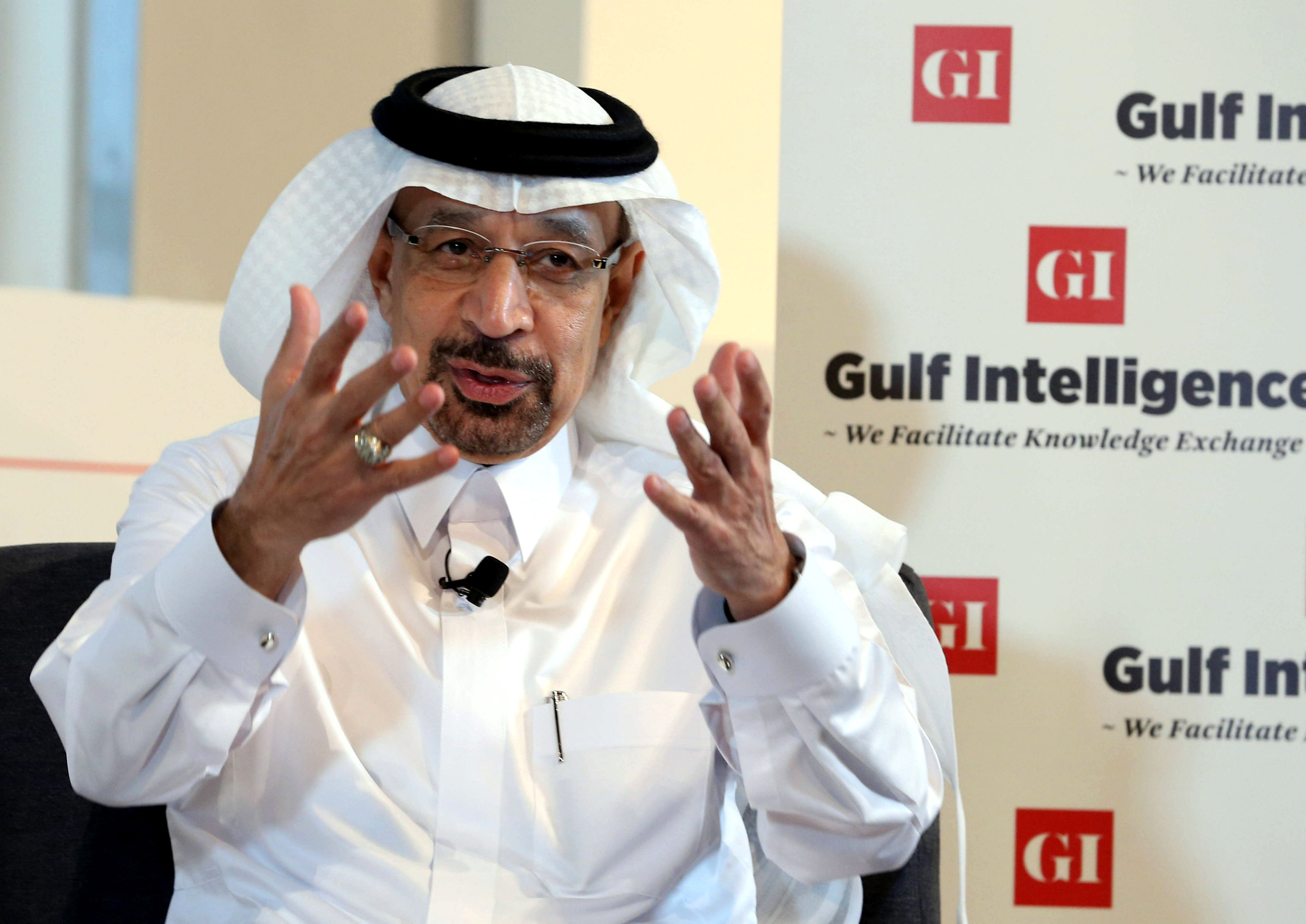
Saudi Energy Minister Khalid Al-Falih at the Gulf Intelligence Saudi Arabia Energy Forum 2019, in Riyadh. (Reuters)
There is no doubting the enthusiasm of government and private sector business in Saudi Arabia to progress to the next phase of the economic and industrial transformation. But there is some confusion, even hesitancy, about the pace of change and the appropriate vehicles to get to the final destination.
This was the message that came across loud and clear from the inaugural Saudi Arabia Energy Forum, held in the King Abdullah Petroleum Studies and Research Center (KAPSARC) in Riyadh on Sunday.
The event’s organizers came up with the snappy title “The Saudi 4.0 Industrial Revolution.” That just about summed up the essence of the gathering. It was about the space where the Vision 2030 diversification strategy meets the Fourth Industrial Revolution beloved of the World Economic Forum. It is fertile ground for debate, discussion and some disagreement.
The headline act was, inevitably, Energy Minister Khalid Al Falih, under whose patronage the event was held. But when he left the stage, there was still a theater-full of heavy-hitting representatives from the public sector, as well as a large contingent of private sector counterparts.
The first panel threw up some interesting findings from the hand-held voting machines used effectively to gauge the state of opinion in the room. For example, the audience overwhelmingly believed that there should be a government-sponsored ranking system of companies on the basis of how far along the Saudi 4.0 road they were — a kind of name and praise or name and shame, depending on where you were in the league table.
However, representatives of two of the government entities on stage — Darren Davies, CEO of mining group Ma’aden, and Yousef Abdullah Al-Benyan, CEO of SABIC — expressed some reservations about such a public contest. Let the market decide, was their motto, whereas the rank and file would be happy to see the government take a leading role.
Other votes threw up some similar interesting quirks. Some 86 percent of the participants at KAPSARC thought that the more their industrial companies knew about the “Saudi 4.0 toolbox” — the data sciences and artificial intelligence techniques driving the transformation — the faster they would get there. But a similar number — 82 percent — thought that not enough was being done to get ahead of the digital transformation curve. They can see the challenge, but do not know how to tackle it.
While these findings may sound theoretical, even abstract, they were brought into sharp relief at a later closed session entitled “Electricity 4.0,” which I had the pleasure to moderate.
As it was conducted under Chatham House rules of anonymity and non-attribution, I am not able to go into too much detail, but I do not think any confidences are betrayed when I report how the conversation encompassed grand visions of policymakers, regulatory experts, industry technocrats and air-conditioning geeks.
One salient fact stood out from this session, which was aimed at understanding how the new analytics and digital data techniques could be used to reduce the Middle East’s dramatically rising energy consumption.
Arizonans use just 20 percent of the electricity used in Gulf households, and pay substantially more in annual bills.
Frank Kane
The US state of Arizona and the Arabian Gulf have pretty similar climates: Very hot summers with cooler but still temperate winters. But Arizonans use just 20 percent of the electricity used in Gulf households, and pay substantially more in annual bills.
The answer to this conundrum involves high-level government policymakers, industry experts, technical analysts and air-conditioning manufacturers, because the need to cool the Arabian summer climate is the biggest guzzler of electrical power in the region. The need to further reduce the amount of oil used in that power generation is also paramount.
There were other examples of where high-level policymaking comes face to face with private citizens’ needs, such as in the increasing use of “smart” energy meters that can inform a consumer’s decision on power usage.
Apparently, industry has found that if you explain to consumers why and how they are using so much electrical power, preferably via a mobile app, they do not mind cutting back or even paying the full economic value of that power.
The inaugural forum was full of such fascinating insights, and leaves much to be discussed at the next event.
- Frank Kane is an award-winning business journalist based in Dubai. Twitter: @ frankkanedubai

